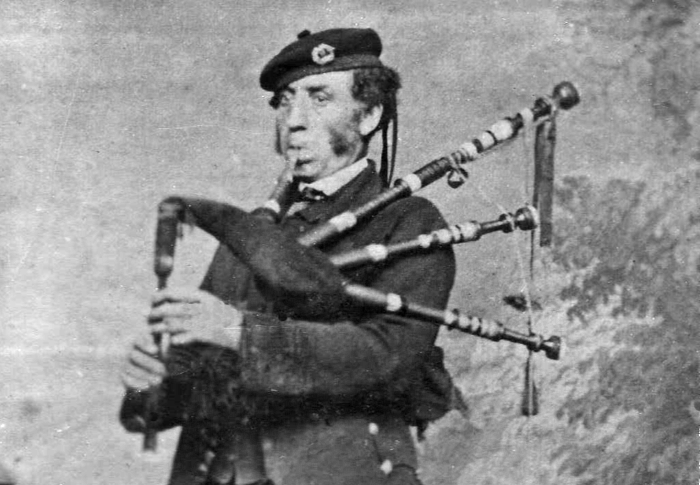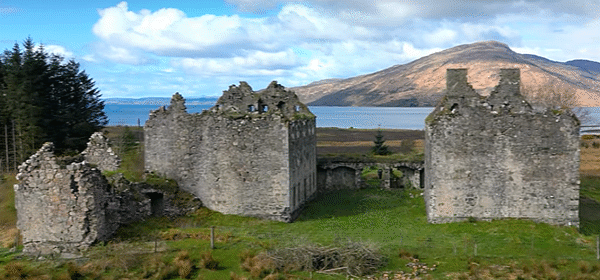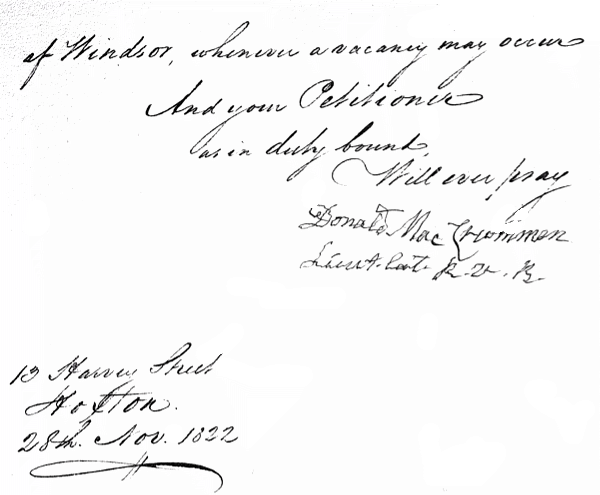
The mention of Donald Ruadh MacCrimmon [pro. approx. Roo -ah] in the report on the Piobaireachd Society Summer School mentions the formal attempts by the Highland Society to provide teaching through him.
This is fine but only tells part of the story. I have copies of several letters by Donald MacCrimmon which add to story. I really should have got around to publishing something on them I suppose, though I have always left the subject of the MacCrimmon pipers to Ruairidh Halford MacLeod.
By Keith Sanger
The MacCrimmon association with Glenelg goes back to when Glenelg was the subject of dispute between the Frasers and MacLeods. MacLeod moved some of his people there to sort of hold the fort.
Roughly halfway between Glenelg and Ardintoul is Carn Cloinn MhicCruimein commemorating a battle during that period. In July 1815 most of the MacCrimmons there seem to have emigrated as a family group to Ontario.
These included John MacCrimmon, farmer-weaver, with his wife Catherine and children Christian, Mary, Patrick and Rebecca; Farquhar MacCrimmon, farmer, with his wife Rachel MacRae and daughter Catherine; Donald MacCrimmon, bachelor, labourer; Duncan MacCrimmon, bachelor, labourer, and Finlay MacRae, farmer, with wife Catherine MacCrimmon and daughter Catherine.
According to Donald’s own words he was wounded in the right leg and lost an eye at the Battle of Camden in the American Revolutionary Wars*. There was a vacancy for a Captain in his regiment for which he, as the senior lieutenant, was about to be promoted when the war ended.
He was again turned down, and I think that, like many of the military who had taken part in the loss of America, that was not a good thing to have on your CV.
When he got back to the UK he petitioned the War Office to complete the promotion and supplied references from Lt Col Tarleton and Colonel Lord Cathcart, his former commanding officers confirming that his promotion was due – but to no avail.
I have the impression that it was a sore point with him, especially having been wounded in his country’s service along with the difference between his half pay as a lieutenant and that of a half pay captain.
Once the Napoleonic Wars started, he made several attempts to obtain a Captain’s post. In the first he wrote that he had gathered enough men along with two officers, an ensign and lieutenant, to form a company with him as captain.

The only reference Donald makes to Glenelg was again a suggestion of a command of a ‘policing force’ based there with, of course, him as captain, but all his petitions were ignored. This letter is addressed from Borreraig, site of the famed MacCrimmon college:
Request made by Lt Donald MacCrummen, late British Legion, to the Viscount Melville, Boreraig Isle of Sky, 2 Octr 1794; Sir, Some mounth ago I had the Honor of offering my service to my King & country in case should be wanted but had no answer as yet now I respect the the same & would do my best endivours to rise a Company but unfortunatly have no money at command but goverment has money & I am willing to serve faithfully & honestly, as I have done before now. There is a small Baracks at Glenelg close by this Isle if Government would think of its repairing it would be amiss & have fifty or sixty men there between this & nxt march if no other use but to prevent smugling & suport the Excise officers
I am sir your Most obidt Sert, Donald Mac Crummen, Lieut in late British Legion
NB My Conduct as an officer I refer to the Right Honorable Lord Cathcart & Earl of Mira who I had the Honor of Serving under there Command
His last appeal was in 1832* he applied to be made one of the ‘Poor Knights of Windsor’, a sort of Chelsea pensioner or veterans refuge for officers. His signature on the application shows signs of age and is very shaky:

Although I do not think I have seen it mentioned elsewhere the testaments of Donald and his son Patrick are among the wills and testaments held in the National Records at Kew. Catalogue references
Prob. 11/1931 and Prob. 11/1915. In his will Donald’s widow is given as Mary Simpson McCrimmon.
- In a 2005 article in ‘Piping Today’ magazine Malcolm MacCrimmon of Alberta, Canada, wrote that Donald Ruadh emigrated to Ontario in 1820 after a fall out with the MacLeods. He, Malcolm, was Donald Ruadh’s great, great grandson. Donald, disillusioned, refused to pass on his piping to his family and thus ended a family tradition dating back to Iain Odhar in the 16th century. The letter above does not seem to have been written from Canada.
- Wikipedia: The Battle of Camden…was a major victory for the British in the Southern theatre of the American Revolutionary War. On August 16, 1780, British forces under Lord Cornwallis routed the numerically superior American forces led by Major General Horatio Gates about four miles north of Camden, South Carolina, thus strengthening the British hold on the Carolinas following the capture of Charleston. The rout was a personally humiliating defeat for Gates, the American general best known for commanding the Patriot forces at the British defeat at Saratoga three years previously. His army had possessed a great numerical superiority over the British force, having twice the personnel, but his command of them was seen as disorganized and chaotic. Following the battle, he was regarded with disdain by his colleagues and he never held a field command again. His political connections, however, helped him avoid any military inquiries or courts martial into the debacle.





















I am Chris Moore from Pukepito, South Otago, New Zealand. My grandfather was John (Jock) McCrimmon Moore and his Great Grandmother was a Mary McCrimmon who married Chas MacKinnon and died in Skye around 1845. Her father was a Farquar McCrimmon.
Her brother was a Major John McCrimmon (d. 1842) from Glenelg of the 11th Regiment who married Frances McDonald of Scalpay (daughter of Norman MacDonald) and their son was Captain Norman S. McCrimmon (d. 1872) of the 74th Highlanders.
Other family members were:
Hugh, Plantation Manager died in Jamaica.
John (Young John) died in Jamiaca 1832
Farquar died 1836
Ann died Invernesshire 1827 or 1828
Lt. Roderick killed Battle of Corunna 1809 (assume 42nd Highlanders)
Ensign Donald (Duncan?) 42nd Highlanders killed Battle of Toulouse 1814
Possibly others who died while children.
There were also Glenelg MacCrimmons who made their way to the border between present day North and South Carolina in the USA around 1819-20 as well. I descend from one of them. The spelling became McRimmon here. Donald Ruaidh lived briefly in North Carolina near present day Pinehurst and Carthage (I.e. the U.S. Open golf tournament taking place as I write) and was also at he Battle of Moore’s Creek in 1776 as a commander of a loyalist company he had raised. Would be very interested in corresponding further to see if connections can be established between these Carolina Glenelg McRimmons and the other families of the name from Glenelg.